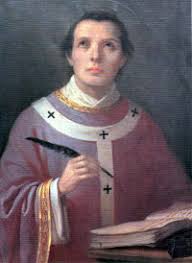 |
| "Hello? Anyone up there?" |
Last night, as I read Anselm's medieval proof for the existence of God for my history class, I was struck by the sheer quirkiness of some of the headings. My favorite:
"How the fool managed to say in his heart that which cannot be thought."
These words served to remind me, quite out of context (because, as I learned with the help of Marjorie Thompson's
Soul Feast, I like to read most things
spiritually as well as intellectually), that foolishness has its place. Or more precisely, that which at first appears to be foolish (random, eccentric, strange, creative) often turns out to be quite ingenious. I thought of this also as I read Edward Hallowell's article entitled "Why Smart People Underperform." Hallowell cites David Neeleman, CEO of JetBlue airlines, as an executive who has used his ADD to advantage, "going with the symptoms" as Thomas Moore would say, harnessing his own creative power and seemingly crazy ideas (such as electronic airline tickets), and honoring the same in his colleagues and friends and employees. It's good to get shaken up and crazy sometimes.
Speaking of which, here's another
incredibly wonderful fool.
It's also good to just sit and stir sometimes. This week for Spirituality in the Contemporary World we've been asked to take a sort of inventory of our own spiritual practices, and I thought I'd use this little blog as a forum for the list. It's actually quite fortuitous that we've been asked to do this now, because I've lately been shifting into a new pattern, partly in an attempt to be a bit more healthy in body and soul. It's all about heeding that inkling that something might be good for you, and then following through with it. That second part's tricky, at least for me.
(By the way, I recently discovered that a group of colleagues at Oxford that included J.R.R. Tolkien and C.S. Lewis was called "The Inklings." I just think that would be a fantastic band name, don't you?)
As I mentioned in an earlier post, my partner Tarra and I have taken to the gym five or six days a week since 2011 began. This has been a remarkably centering and engaging activity for both of us, and it gives us time to simply be together. Whatever is going on in other regions of our lives, we can be sure to have this time, and that is a great comfort. There is also nothing I love more than good music in the earbuds and a good rhythm on the treadmill, or elliptical, or bike, or shoulder press...
 |
Beautiful surroundings seem to inevitably invoke
beautiful feelings. |
I've been taking ten or fifteen minutes each day to sit in silence. This is time to just be. To let my mind and my heart do what they need to, with no judgement, no pressure, no tasks or appointments or classes or rehearsals. I find it helpful to set an alarm, and I've found that the "bell tower" ring tone on my iPhone is a particularly pleasing accompaniment as I return to the world. This practice was partially sparked by
Soul Feast- which you've probably gathered I enjoyed- which gave me much appreciated insight into different forms of prayer, and is helping me to reconfigure how I think about meditation. I've always had a feeling it would be good for me, but didn't know quite how to go about it.
The time I spend in meditation and prayer lately has taken on a number of different forms, including a simple non-judgmental clearing of the mind, a meditation on something I've read or listened to, a mantra-like repetition of affirmations and supplications...and after a certain time, the mist seems to clear, and I remember those moments of clarity I've had in the past, when I've become aware of a fear I didn't even know I had surrendered to, or I'm suddenly able to vividly inhabit a lovely memory that had not had a chance to surface for quite some time.
I believe this experience helps me to practice the "relaxation response," and I've noticed that these affirmations of beauty and releases of fear come easier to me elsewhere in my life as a result, because I remember that silent space in which I was able to simply be. I love it when I'm able to carry a little bit of that
being life into my
doing life. It is a tiny step toward the balance I, and I think many of us, seek in all things.
"We pray as well as we live and we live as well as we pray."
-Lawrence S. Cunningham






